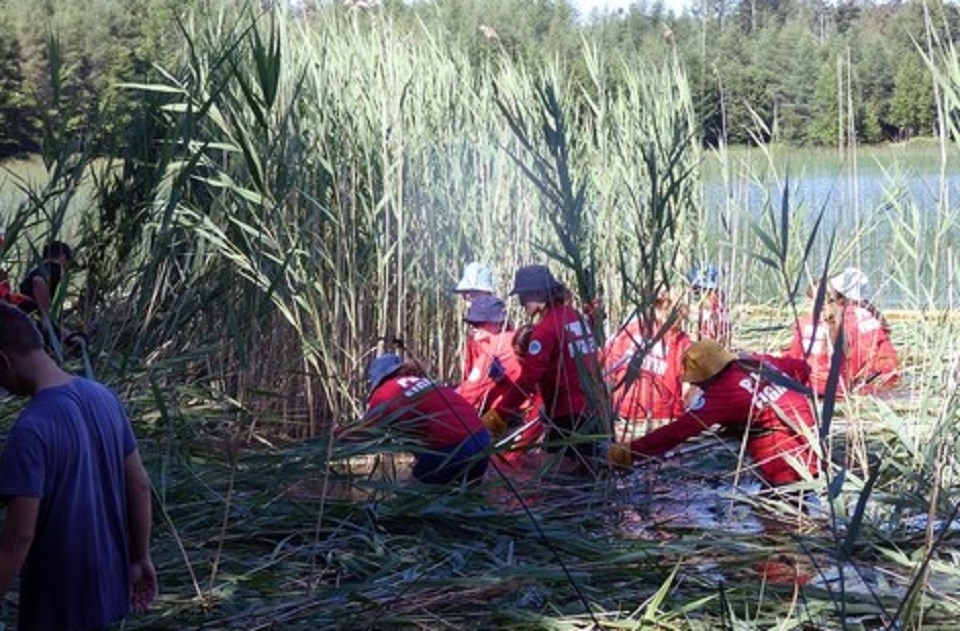The Phragmites Working Group Lake Bernard based in Sundridge and Strong has begun an education program to help boaters become more aware of the need to ensure their boats are free of invasive species when removed from lakes.
The group recently enlisted the help of Jeff Berthelette of the Ontario Federation of Anglers and Hunters (OFAH) to help with that education.
Berthelette is the outreach liaison with the OFAH's Invasive Species Awareness Program and says this past January the Ontario Government made it mandatory for boaters to clean, drain and dry their boats when coming out of a water body.
Berthelette spent a day at Lion's Dock in Sundridge with his equipment helping to clean boats that came out of Lake Bernard. What he was looking for were microorganisms clinging to any part of a boat, kayak, canoe and even scuba equipment that if not removed, could be introduced to another water body when the boat or equipment visits another lake.
“That's exactly what we don't want to see happen,” Berthelette said.
“You want to get the invasive species as you come out of the water. And ideally, your boat should be cleaned of invasive species before it goes back into a water body.”
Berthelette blasted the boats coming out of Lake Bernard with a water pressure hose that killed anything on the boat. He hit all the points that were in the water. Berthelette said although he used a pressure washer to do the job for him, the cleaning process is very simple and people can do the actual cleaning with their hands.
“You would start at the bumper and just feel for any invasive species that might be there like mud, debris and plant matter,” he said.
“Pay close attention to the prop because that's where plants are chopped up and can hide. Once you've removed everything, don't throw it back in the water because that's not solving the problem. Put it in a garbage bag."
Berhelette says the entire process takes only a few minutes. He adds leaving the boat in the sun's heat helps disinfect it.
Berthelette works out of the OFAH Peterborough office and is able to provide the invasive species cleaning service through a grant from the Ontario Trillium Foundation. Berthelette has been carrying out the education program for several weeks in a number of communities and he says many of the people he's talked to were not aware of the Clean, Drain and Dry legislation.
He adds many welcomed his input on how to clean their water craft.
Berthelette says only a small number of boaters did not receive news of the new legislation well but because many are responding favourably, he believes the OFAH Invasive Species Awareness Program is making “a positive impact”.
Berthelette encourages the public to visit the www.invasivespecies.com website for free downloadable information with more information on how to fight invasive species.
One of the larger invasive species in Lake Bernard, and on the land next to the lake, are phragmites plants.
The local group fighting this invasive species is nicknamed Phrag Fighters. Abby Flynn is one of the Phrag Fighters and says the group is now in its 6th year of trying to eradicate phragmites from the Lake Bernard area.
For now, the Phrag Fighters are tackling the land-based phragmites stalks. They will enter the lake on July 15, when fish spawning season is over and their work in the water is not a threat to the fish population.
It's believed phragmites entered the Almaguin area sometime during the 1990s. They were likely introduced not only by boats but also ATVs and even construction vehicles that picked up the plant in one area and unknowingly transported it to other regions.
Flynn says phragmites “can overrun an entire wetland very quickly."
“They also change the physical make-up of the soil so that it's only suitable for them. It kills all other native species and makes the habitat unlivable for fish, birds, insects and turtles”.
Flynn, who is also an Invasive Technician with the OFAH Invasive Species Awareness Program, says the Phrag Fighters have a new invasive plant to contend with and it's the Japanese Knotweed.
“This one is a terrestrial plant and we're finding it more and more across Sundridge”, she said.
“It's also called the mile-a-minute plant because it spreads and grows so fast and out competes all native species. We've started to educate people why it's bad and why they should be on the lookout for it. It's been a plant that's been here for a while but our group is only now discovering it. We want to stop it in its tracks before it gets too bad”.
As an example of how damaging Japanese Knotweeds can be to homeowners, Flynn says they are such a major problem in the United Kingdom to the point there are laws in place where people can't get property insurance because the plant has been known to go through foundations.
Rocco Frangione is a Local Journalism Initiative reporter who works out of the North Bay Nugget. The Local Journalism Initiative is funded by the Government of Canada.



